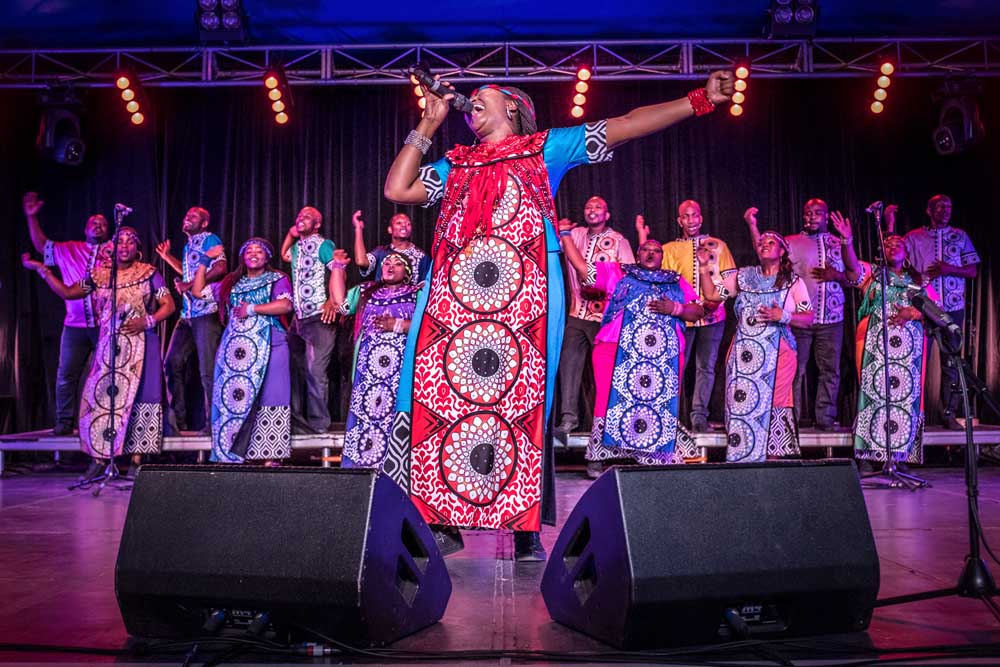Soweto Gospel Choir blends spiritual traditions in Bend
Published 12:00 am Thursday, October 11, 2018

- South Africa’s Soweto Gospel Choir will perform a set commemorating the centennial of Nelson Mandela’s birth at the Tower Theatre on Tuesday.(Submitted photo)
When South Africa’s Soweto Gospel Choir won its first Grammy in 2007, Nelson Mandela shared in the triumph.
The group won Best Traditional World Music Album for its 2006 sophomore effort, “Blessed.” Choirmaster, choreographer, dancer, singer and founding member Shimmy Jiyane recalled meeting the anti-Apartheid revolutionary and South Africa’s first black president. (The group performed for Mandela previously in 2003 at the 46664 Concert, an AIDS benefit hosted by Mandela in Cape Town, South Africa.)
“When we won our first Grammy in 2007, we went and presented the Grammy to him,” Jiyane said recently from a hotel in Glendale, California. Twenty members of the group arrived there a few days earlier for a U.S. tour that hits the Tower Theatre on Tuesday. “And he was there, and he was excited.”
Soweto Gospel Choir, formed in 2002 and named for the South African township just southwest of Johannesburg, maintained a close relationship with Mandela for the rest of his life, performing for him and his children numerous times, Jiyane said. To commemorate the 100th anniversary of Mandela’s birth this year, the choir released the studio album “Freedom” in September and is touring behind it with a show titled Songs of the Free. The album features many of Mandela’s favorite, traditional South African spirituals, as well as the choir’s versions of Leonard Cohen’s “Hallelujah” and a Southern gospel medley.
The choir’s close relationship with Mandela isn’t hard to understand. Its mission to further South African gospel traditions while offering fresh takes on Western spirituals goes hand-in-hand with Mandela’s long struggle to end Apartheid and unite his country — which feels particularly significant given the social, racial and political divides the U.S. and world at large struggles with today.
“You must understand that Nelson Mandela went to jail for 27 years … just for South Africa to be free,” Jiyane said. “When he came back in 1994, Nelson Mandela became the first black South African president. And what he did — he did something that nobody has ever done. He was tortured, he was beaten — they did a lot of bad things to him — but when he came back, he said, ‘I’m not going to (take) revenge or whatever. What I’m gonna do is, I’m gonna structure my country, and I’m gonna make my country to be the most beautiful country ever, and I’m gonna make sure that black, white and everything come together and I will make it a rainbow nation that we all will be one.
“But he also instilled one thing into us: You must learn to forgive, but never forget, what happened,” Jiyane continued. “That’s why today we are not even scared to call him our daddy — we’re not even ashamed to call him our president because what he stood for — he stood for peace, joy and happiness within the people of South Africa and within the people of the world. So we stand for that, and … always when we go onstage, that’s what we always try to say to people. It is possible. It might be difficult, but it is possible.”
Original choirmaster David Mulovhedzi, who died in 2009, founded the group with executive producer and director Beverly Bryer, who is still with the group today. A debut album, “Voices from Heaven,” followed in 2003, and soon the group was touring the world and working with artists such as U2, Stevie Wonder, Robert Plant, Celine Dion and more.
Today the group features close to 50 members, who will split up to cover the group’s concurrent American and European tours.
Jiyane auditioned for the group after seeing announcements in newspapers and on TV, he said. He was hired as a dancer and choreographer, having worked with artists such as Tina Turner, according to the group’s website, and later became a lead tenor singer.
“With dancing, you can only express yourself by moving your body — moving your body in different types of shakes and whatever — but with singing, you can actually sing and speak out, and people will hear and listen to you,” Jiyane said. “It was not that difficult that way, but it gave me a challenge whereby I had now to sing, I had now to tone my voice. … With singing, you don’t even have (the ability) to go off-key; you’ve got to stay on key. With dancing, it’s a bit easier because if I move, and especially when I do the African moves and everything, you wouldn’t tell me if I’m doing it wrong because I’m moving with the beat and I gotta stay with the rhythm.”
In addition to the Mandela tribute set, Bendites can expect a wide range of Southern spirituals, popular songs such as “Hallelujah” and a tribute to soul giant (and past collaborator) Aretha Franklin. In this way, the group draws throughlines and comparisons between the African-inspired, Western gospel tradition and South Africa’s own longstanding history with gospel music.
“We do the South African favorite hymns; we do the American spirituals that we do in the choir, but we put our own feel into it,” Jiyane said. “So we mix the two, and then we draw (on) our South African traditional music to showcase the different cultures and faiths that we have in our country. You must remember, South Africa has got 11 official languages, … and in our show we sing in six of those. We try and bring each and every culture into each and every song that we sing so that people can see.”








